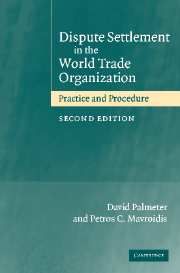9 - Conclusion
Published online by Cambridge University Press: 05 March 2012
Summary
The World Trade Organization's Dispute Settlement Understanding represents, in the words of Celso Lafer, a former chairman of the Dispute Settlement Body, a “thickening of legality.” In the “symbiosis of diplomacy and litigation,” the DSU represents a decided move of the GATT/WTO dispute settlement system away from diplomacy and toward litigation.
But this move does not diminish the importance of diplomacy. Diplomacy and the negotiations that characterize it will, of necessity, remain central to any international organization composed of governments. Diplomacy, indeed, is the process by which international rules, including WTO rules, are established. Litigation is simply the application of those negotiated rules. The possibility of litigation and the foreseeability of outcomes based on agreed rules become part of the diplomatic process itself, factors that diplomats take into account in their dealings with one another.
A case may go forward because the outcome of the application of the rules to the facts of a particular dispute is not clear in advance. Or, it may go forward, even though the outcome is clear, because a government may wish to show a domestic constituency that it did all that it could, or because it may wish to show a parochial ministry the consequences of not considering international commitments before acting, or because it simply wants to “buy time” before making a change.
Often, however, the cases will be settled. A negotiated solution will be reached, even “on the court house steps.
- Type
- Chapter
- Information
- Dispute Settlement in the World Trade OrganizationPractice and Procedure, pp. 303 - 305Publisher: Cambridge University PressPrint publication year: 2004



